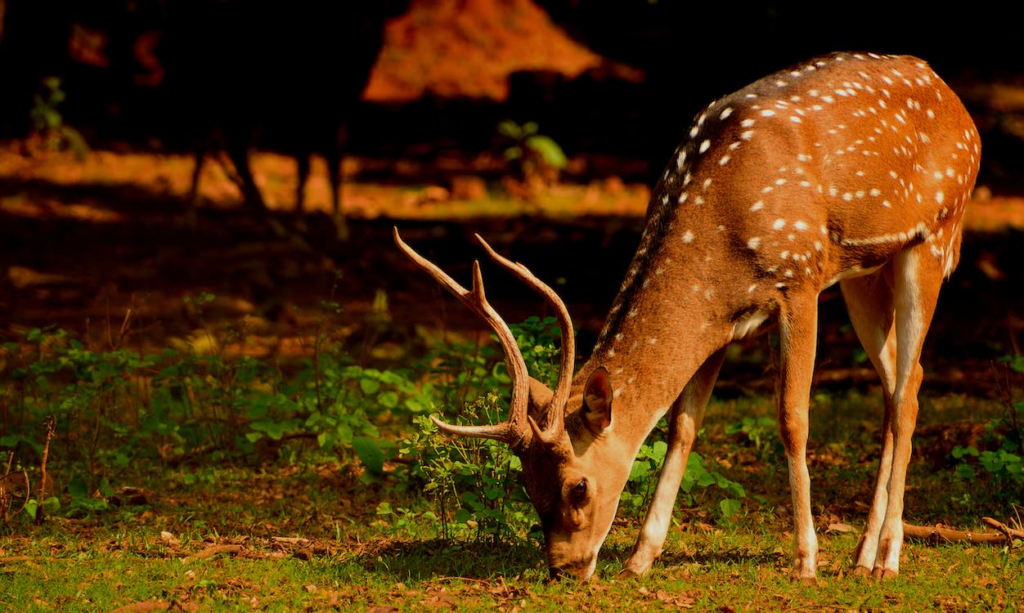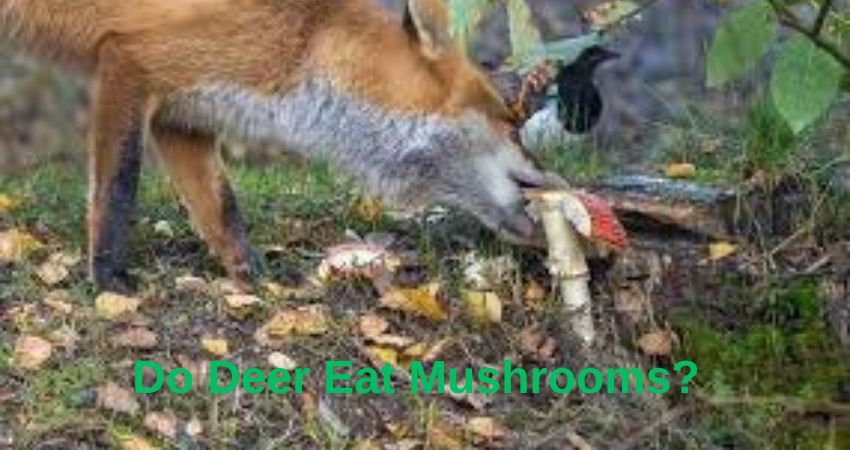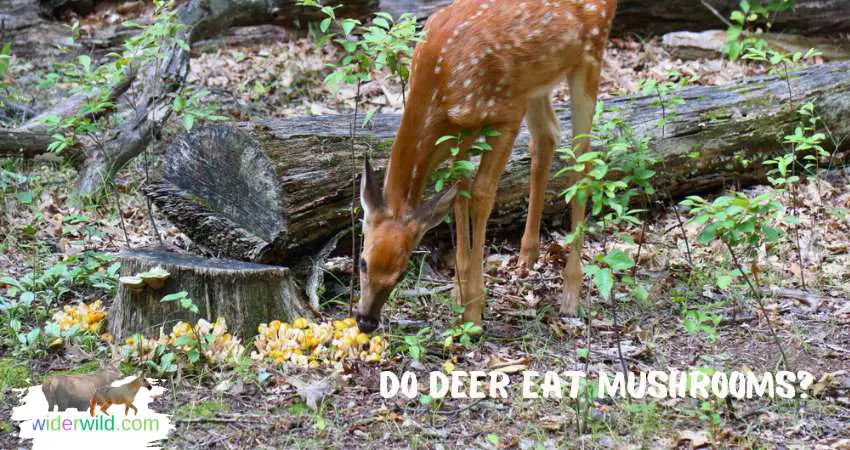Do deer eat mushrooms really? Yes, deer do eat mushrooms. Mushrooms are a part of their natural diet.
Deer are fascinating creatures that thrive in various habitats, including forests and grasslands. They are known to be herbivores, primarily consuming a combination of leaves, fruits, nuts, and grass.
However, their diet isn’t limited to just vegetation. While mushrooms may not be their main source of food, deer do indeed consume them.
Mushrooms are a rich source of nutrients and contain various beneficial compounds that can supplement the deer’s diet.
While some mushrooms are safe for deer to eat, others can be toxic, so they have the ability to discern between edible and potentially harmful varieties.
This adaptation allows them to incorporate mushrooms into their diet, contributing to their overall health and survival.
Deer may occasionally consume wild mushrooms. if we were to analyze the potential nutritional components of mushrooms that could benefit deer when they consume safe varieties, it might look like this:
| Nutritional Component | Potential Benefits for Deer |
|---|---|
| Water | Provides hydration, especially in dry seasons. |
| Protein | Supports muscle growth and repair. |
| Fiber | Aids in digestion and may contribute to overall gut health. |
| Minerals (e.g., selenium, potassium) | Helps maintain proper bodily functions. |
| Vitamins (e.g., B vitamins) | Supports various metabolic processes. |
| Antioxidants | Can help protect cells from damage. |
what is the safe mushrooms list for deer?
Deer-eatable safe mushrooms can depend on various factors, including species and geographic location, some wild mushrooms are generally considered safer for consumption. These may include:
Chanterelles (Cantharellus spp.): Many species of chanterelles are edible and safe for both humans and animals.
Morel Mushrooms (Morchella spp.): Morels are a highly sought-after edible mushroom and are generally safe for consumption by deer.
Puffball Mushrooms (Calvatia spp.): Some puffball species are edible and considered safe.
Oyster Mushrooms (Pleurotus spp.): Oyster mushrooms are often considered safe and are edible for humans as well.
Hen of the Woods (Grifola frondosa): Also known as maitake, this mushroom is generally considered safe.
Lion’s Mane Mushroom (Hericium spp.): Lion’s mane mushrooms are safe to eat and are known for their distinctive appearance.
These mushrooms are generally considered safe, individual reactions can vary, and some people and animals may be sensitive to specific species.
The best practice is to discourage deer from consuming any wild mushrooms to ensure their safety, as many wild mushrooms are toxic and can be harmful or even fatal if ingested.
Deer should primarily rely on natural vegetation as their main source of nutrition.
Why Do Deer Eat Mushrooms?

Image source: Kapilash
Deer have been observed consuming mushrooms, raising questions about their motivation. One possible reason for this behavior is the nutritional benefits mushrooms offer.
Mushrooms are a rich source of vitamins, minerals, and antioxidants, which play a vital role in maintaining deer health.
Their consumption may support the deer’s overall well-being and immune system. Additionally, mushrooms can provide a wide range of phytochemicals that offer protection against diseases and promote longevity.
The impact of mushroom consumption on deer health is significant, contributing to their overall fitness and survival in the wild.
Further research is needed to fully understand why deer eat mushrooms and the benefits they gain from this dietary choice. Nonetheless, mushrooms play a significant role in the deer’s diet, contributing to their overall nutritional intake.
what kind of mushrooms do deer eat?

Deer are known to have diverse dietary preferences, and mushrooms are no exception. Understanding the types of mushrooms that deer consume is essential for managing their habitats effectively.
In common mushroom varieties, deer tend to favor those that are easily accessible and have specific characteristics.
Identifying these mushrooms can be crucial for maintaining a balance in their diet. Some prevalent mushroom species in the deer diet include Agaricus and Amanita varieties.
These mushrooms differ in terms of size, color, and habitat. While deer primarily rely on vegetation as their main food source, mushrooms are an additional delicacy often consumed when available.
By understanding the prevalence of mushrooms in deer diets, conservation efforts can be more comprehensive and tailored to their nutritional needs.
So, observing and learning about the mushrooms preferred by deer can aid in promoting a healthy ecosystem.
Mushroom Consumption Patterns Of Deer

Deer exhibit varying patterns in consuming mushrooms, with seasonal variations playing a significant role. They possess an intriguing foraging behavior and employ various techniques to search for mushrooms, making it a fascinating sight to behold.
Understanding the frequency of mushroom consumption by deer is crucial in comprehending their dietary preferences.
By observing their feeding habits, it becomes apparent that deer have specific strategies for finding and eating mushrooms, allowing them to navigate their environment effectively.
Their innate ability to locate and feed on mushrooms highlights their adaptability and resourcefulness in acquiring nutrition.
Consequently, deer’s consumption of mushrooms is influenced by factors such as seasonality, availability, and their inherent foraging techniques.
The intriguing interplay between deer and mushrooms showcases a complex ecosystem where both species coexist and rely on each other for survival.
Potential Dangers And Risks For Deer
Deer are known for their herbivorous diet, but when it comes to mushrooms, caution is warranted.
Some mushrooms can be toxic and pose potential dangers and risks to deer populations. It is crucial to identify and avoid specific toxic mushrooms that may cause health issues when consumed.
Poisoning can have adverse effects on the overall deer population. To protect these animals from potential harm, it is important to understand the types of mushrooms that are toxic and prevent their consumption.
By being vigilant and knowledgeable about the potential dangers associated with mushrooms, we can help preserve the health and well-being of deer populations.
So, the next time you spot mushrooms in the wild, keep in mind the potential risks they may pose to these graceful creatures.
do deer eat morel mushrooms?
Deer’s mushroom preferences can vary based on factors such as availability and nutritional value. They tend to favor certain mushroom species, including but not limited to boletes, chanterelles, and morel mushrooms.
These species are often sought after by deer due to their distinct flavors and high nutrient content.
The choice of mushrooms can also be influenced by the availability of other food sources in the area. When mushrooms are abundant, deer might focus more on consuming them, while they may switch to other food sources when mushrooms are scarce.
Deer’s interaction with other food sources plays a significant role in determining their mushroom consumption.
Deer’s mushroom preferences are influenced by several factors, including species availability and the presence of alternative food options in their habitat.
do deer eat wild mushrooms?

Deer, including species like white-tailed deer, and mule deer may occasionally eat wild mushrooms when they encounter them in their natural habitat.
However, this behavior is not specific to a particular type of deer and varies depending on geographic location and mushroom availability.
It’s crucial to note that many wild mushrooms are toxic to both humans and animals, including deer. Therefore, while deer may sample mushrooms, it’s not a significant part of their diet, and consuming toxic mushrooms can have severe health consequences for them.
To minimize these risks, it’s essential to discourage the growth of toxic mushrooms in areas frequented by deer and ensure they have access to a variety of safe, natural food sources in their environment.
Studying Deer And Mushroom Consumption
Deer and mushroom consumption have been a topic of interest in both field studies and scientific literature. Researchers have employed various methods and techniques to gain insights into this dietary habit.
Through field studies and observations, experts have closely monitored the behavior of deer in their natural habitat to determine their mushroom-eating tendencies.
Additionally, they have examined scientific literature to gather information from previous studies on the subject. These studies have shed light on the types of mushrooms that deer prefer and the potential impact on their health.
The findings suggest that certain species of deer have a higher inclination towards consuming mushrooms, while others show little to no interest.
Understanding deer’s relationship with mushrooms can provide valuable knowledge for wildlife management and conservation efforts.
Conservation And Management Implications
Deer are known to consume a wide range of food sources, including mushrooms. This has significant implications for conservation and management practices.
The impact of deer on forest ecosystems cannot be overlooked. It is crucial to maintain sustainable deer populations to ensure the balance of the ecosystem.
Strategies for mitigating the negative effects of deer on forests should be explored.
By understanding their dietary habits, we can implement measures to protect delicate fungal communities while also managing deer populations effectively. This would help preserve the overall health and biodiversity of our forests.
By addressing the interaction between deer and mushrooms, we can adopt a holistic approach to forest management, striking a balance between conservation and the needs of these majestic creatures.
Coexistence Of Deer And Mushrooms
Deer plays a crucial role in the ecological balance by indirectly promoting the growth of mushrooms. Through their feeding habits, deer inadvertently spread mushroom spores across their habitats, aiding their dispersal and reproduction.
This leads to the establishment of diverse mushroom species in different areas, contributing to the overall biodiversity of plant communities.
The consumption of mushrooms by deer also prevents the overgrowth of certain species, allowing for a healthier balance within ecosystems.
This coexistence between deer and mushrooms highlights the positive ecological interactions that exist in nature, where different organisms play important roles in maintaining a harmonious and thriving environment.
The relationship between deer and mushrooms showcases the interconnectedness of all living beings and the significance of their contributions to the natural world.
Frequently Asked Questions For Do Deer Eat Mushrooms?
What Kind Of Mushrooms Does Deer Eat?
Deer eat a variety of mushrooms, including oyster, puffball, and fly agaric mushrooms.
The specific types of mushrooms that deer eat can vary widely based on geographic location and the availability of mushrooms in their environment. Deer’s consumption of mushrooms is sporadic and not a primary part of their diet.
While some mushrooms may be safe for deer to eat, many wild mushrooms are toxic, and ingesting them can be harmful or even fatal to deer.
Therefore, it’s essential to discourage the growth of toxic mushrooms in areas frequented by deer and ensure they have access to a diverse diet of natural vegetation to minimize the chances of them consuming harmful fungi.
Can I Feed Deer Mushrooms?
No, it is not recommended to feed deer mushrooms as it can be harmful to their health. In general, it’s safer to assume that most wild mushrooms are potentially harmful to deer, and it’s best to discourage deer from consuming mushrooms altogether.
Instead, focus on providing deer with a natural diet of vegetation found in their habitat, which is their primary and most reliable source of nutrition. This approach helps ensure the well-being of deer and reduces the risk of them ingesting toxic mushrooms.
What Animal Eats Mushrooms In My Yard?
Depending on your location and the specific mushroom species growing there. Some animals that are known to consume mushrooms include:
Deer: As mentioned earlier, deer may nibble on mushrooms if they encounter them.
Squirrels: Squirrels are known to consume a variety of mushrooms and fungi as part of their diet.
Rabbits: Wild rabbits may eat certain types of mushrooms, although they tend to avoid toxic ones.
Insects: Some insects, such as beetles and flies, may feed on mushrooms and assist in their decomposition.
Wild Boars: In areas where wild boars are present, they can be significant consumers of mushrooms.
Slugs and Snails: These small creatures are often found grazing on mushrooms in damp environments.
Can Deer Eat Store-Bought Mushrooms?
Deer can technically eat store-bought mushrooms, but it’s not a recommended or natural part of their diet.
Store-bought mushrooms are typically cultivated and may have different varieties, some of which are safe for human consumption but not necessarily suitable for deer.
Moreover, store-bought mushrooms are generally not a primary food source for deer, primarily relying on natural vegetation.
What mushrooms are not safe for deer?
Here’s a list of some wild mushrooms that are known to be toxic to deer and should be avoided:
- Amanita species (e.g., Amanita phalloides, known as the Death Cap)
- Gyromitra species (e.g., Gyromitra esculenta, known as the False Morel)
- Galerina species
- Cortinarius species
- Inocybe species
These are just a few examples, and many other toxic mushroom species can be harmful to both humans and animals, including deer.
It’s essential to prioritize the safety of deer and discourage them from consuming any wild mushrooms, as the risk of toxicity far outweighs any potential nutritional benefits.
Final Thought
Deer, known for their grazing habits, also have a fondness for mushrooms. Complementing their primary diet of plants and shrubs, mushrooms provide valuable nutrients that contribute to their overall well-being.
Across their diverse habitats, from woody forests to open grasslands, deer opportunistically consume various mushroom varieties.
Despite the risk of poisoning from certain fungi, deer possess an uncanny ability to discern safe options. Whether guided by scent, taste, or nutritional value, mushrooms hold a significant place in a deer’s dietary choices.
As we delve deeper into the intricate workings of nature, understanding the dietary habits of wildlife, such as deer, highlights the remarkable adaptability and complexity of these creatures.
Therefore, the next time you encounter mushrooms in the wild, remember their dual role: playing a vital part in the ecosystem while serving as a delectable treat for our graceful deer.
Read Related Post on Deer Diet and Feeding Habits:

